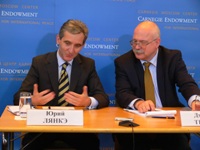{
"authors": [
"Iurie Leancă",
"Dmitri Trenin"
],
"type": "event",
"centerAffiliationAll": "dc",
"centers": [
"Carnegie Endowment for International Peace",
"Carnegie Europe",
"Carnegie Russia Eurasia Center"
],
"collections": [],
"englishNewsletterAll": "",
"nonEnglishNewsletterAll": "",
"primaryCenter": "Carnegie Endowment for International Peace",
"programAffiliation": "russia",
"programs": [
"Russia and Eurasia"
],
"projects": [],
"regions": [
"Caucasus",
"Russia",
"Eastern Europe",
"Moldova"
],
"topics": []
}
Moldova's Foreign Policy and the Prospects for Russian-Moldovan Relations
Thu, May 27th, 2010
Moscow
IMGXYZ2552IMGZYXMoldova is Europe’s poorest country, and it faces the difficult task of creating the conditions necessary for sustainable development and modernization. The nation’s foreign policy is focused on the realization of this aim. Moldova’s minister of foreign affairs and European integration, Iurie Leancă, discussed Moldova’s efforts at modernization and its relations with neighbors at the Carnegie Moscow Center. Carnegie’s Dmitri Trenin moderated.
Moldova and the European Union
According to public opinion polls, 70 percent of Moldovan citizens are in favor of Moldova’s membership in the EU. Leancă underscored that the only possible path to Moldova’s modernization is Europeanization. This path is the stimulus for a number of reforms in the political, economic, and social spheres. Since the coalition government came to power in September 2009, it has enacted several “euroreforms,” or reforms that are intended to aid Moldova in meeting its current and future obligations as it looks towards a future as a country in the European Union.
Moldova and Romania
Moldova emerged as an independent country after the break-up of the Soviet Union in 1991. To this day, the documents on the border regime with Romania and the base political agreement between the two nations have not been signed. In Leancă’s opinion, the problems between Moldova and Romania are mainly artificial. Leancă asserted that the key to establishing constructive bilateral relations is a change in tone and attitude, moving from confrontation to dialogue.
Moldova and Other Countries of the Post-Soviet Space
Leancă emphasized that it is crucial for Moldova to build up good neighborly relations with Russia and Ukraine, both of which have significant political and economic clout in the region.
- Russia. While Moscow initially seemed to view the new Moldovan coalition government with some skepticism, lately there has been a good political dialogue between the two nations, and better trade relations have developed.
- Ukraine. Due to the absence of a political dialogue, a number of problems accumulated over the past several years, among them the issues of property ownership and border demarcation. Leancă expressed optimism that these issues would be resolved, with positive ramifications for bilateral relations.
Trenin observed that currently, twenty years after the break-up of the USSR, the people of Moldova as well as Russia face new realities that do not fully agree with their previous expectations. In the face of these new trends, new international relations must be forged that are qualitatively different from those that had existed before.
Carnegie does not take institutional positions on public policy issues; the views represented herein are those of the author(s) and do not necessarily reflect the views of Carnegie, its staff, or its trustees.
Event Speakers
Iurie Leancă
Dmitri Trenin
Former Director, Carnegie Moscow Center
Trenin was director of the Carnegie Moscow Center from 2008 to early 2022.